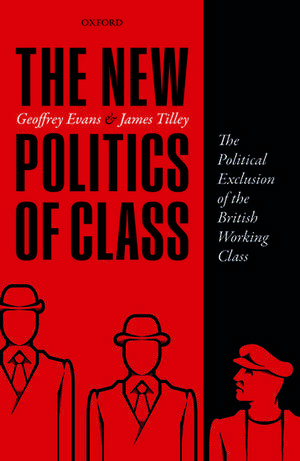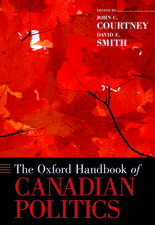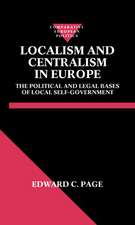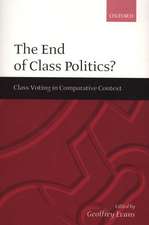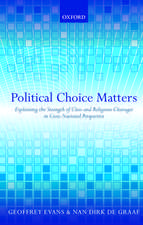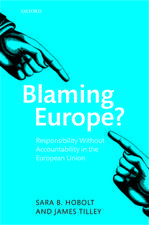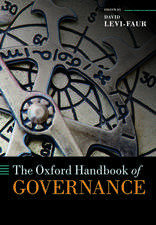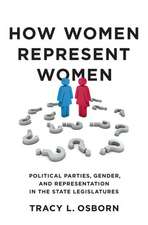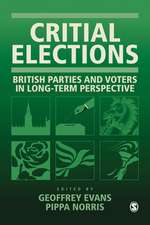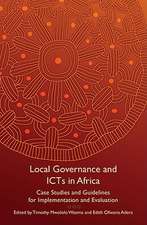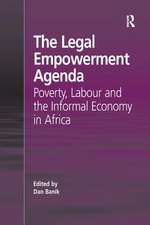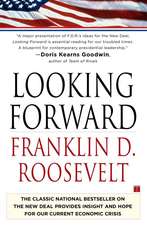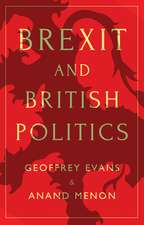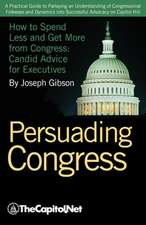The New Politics of Class: The Political Exclusion of the British Working Class
Autor Geoffrey Evans, James Tilleyen Limba Engleză Hardback – 23 feb 2017
Preț: 338.53 lei
Nou
Puncte Express: 508
Preț estimativ în valută:
64.78€ • 67.81$ • 53.60£
64.78€ • 67.81$ • 53.60£
Carte tipărită la comandă
Livrare economică 26 martie-01 aprilie
Preluare comenzi: 021 569.72.76
Specificații
ISBN-13: 9780198755753
ISBN-10: 0198755759
Pagini: 252
Dimensiuni: 161 x 241 x 21 mm
Greutate: 0.5 kg
Editura: OUP OXFORD
Colecția OUP Oxford
Locul publicării:Oxford, United Kingdom
ISBN-10: 0198755759
Pagini: 252
Dimensiuni: 161 x 241 x 21 mm
Greutate: 0.5 kg
Editura: OUP OXFORD
Colecția OUP Oxford
Locul publicării:Oxford, United Kingdom
Recenzii
This is a book of outstanding academic and political importance. It reveals the changing relationship between social class and party support over recent decades and brings out the far-reaching implications for British political life in the post-Brexit era.
In a masterly analysis of long-term social and political change in Britain, Evans and Tilley show that people's class position still influences their values - but that this class divide is now little reflected at the ballot box. Their findings leave us pondering whether social democratic parties like Labour can successfully adapt to a world in which the university graduate is coming to be more commonplace than the manual worker.
This book challenges the prevailing view that class politics in Britain is no more. It provides an important corrective to conventional wisdom regarding the decline of class, and a vital contribution to understanding the falling turnout of the working class.
This book demonstrates that class politics is alive in Britain, but has taken on a new shape. The size and make-up of classes have changed, yet their distinctive preferences remain. It is the strategic reactions of office-seeking parties to these changes in class proportions, above all that of the Labour Party, that explain why classes have realigned their partisan affiliations. Splendidly captured through the lens of British politics, this book more generally illustrates the core political dynamics of post-industrial democratic capitalism.
In a masterly analysis of long-term social and political change in Britain, Evans and Tilley show that people's class position still influences their values - but that this class divide is now little reflected at the ballot box. Their findings leave us pondering whether social democratic parties like Labour can successfully adapt to a world in which the university graduate is coming to be more commonplace than the manual worker.
This book challenges the prevailing view that class politics in Britain is no more. It provides an important corrective to conventional wisdom regarding the decline of class, and a vital contribution to understanding the falling turnout of the working class.
This book demonstrates that class politics is alive in Britain, but has taken on a new shape. The size and make-up of classes have changed, yet their distinctive preferences remain. It is the strategic reactions of office-seeking parties to these changes in class proportions, above all that of the Labour Party, that explain why classes have realigned their partisan affiliations. Splendidly captured through the lens of British politics, this book more generally illustrates the core political dynamics of post-industrial democratic capitalism.
Notă biografică
Geoffrey Evans is Professor of the Sociology of Politics, University of Oxford and Official Fellow in Politics, Nuffield College. He has published extensively in political science, sociology, and related disciplines on social structure, public opinion, and political behaviour. His publications include The End of Class Politics? (OUP, 1999) and Political Choice Matters: Explaining the Strength of Class and Religious Cleavages in Cross-National Perspective (OUP, 2013). He is also an editor for the journal Electoral Studies.James Tilley is a Professor of Politics, the University of Oxford and a Fellow of Jesus College, Oxford. His research is mainly in the fields of public opinion and electoral behaviour specialising in British politics. He has published widely on various topics within these fields including the social bases of voting behaviour, generational changes in political attitudes, economic voting and the attribution of responsibility to governments, and sources of public support for the EU. His recent publications include Blaming Europe? Responsibility without Accountability in the European Union (co-authored with Sara B. Hobolt, OUP, 2014).
